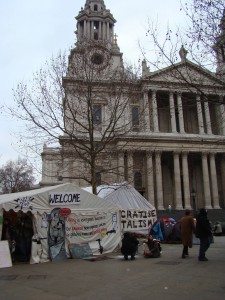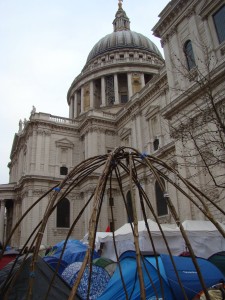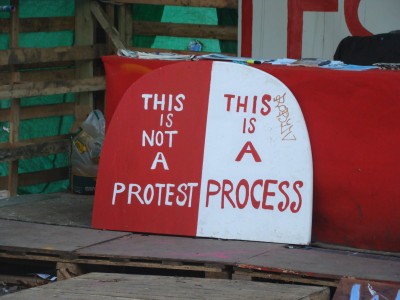With today’s news that the Occupy London Stock Exchange (or Occupy LSX to its friends) is set to be evicted it’s a good moment to assess the impact this extraordinary movement has had on politics today.
As with most British cultural movements it started in America where the Occupy Wall Street movement managed to tenaciously hold on to their camping site until, after what seemed like an age, they finally caught the imagination and sparked similar camps first around the US and then around the world.
On October 15th around two or three thousand people gathered at the steps of St Paul’s with the hope of gaining entry to the London Stock Exchange. In a tense standoff, after a large area was kettled, the protesters eventually took the hint that they weren’t getting outside the Stock Exchange and set up camp in front of St Paul’s instead.
In doing so they opened up an entirely new, unintended dimension to the protest that arguably made Occupy LSX what it was: theology.
As the protest became fixed in people’s minds as one about economic injustice and morality, it tapped into an existing debate about whether capitalism could be “fair” and amplified it.
It was a joy to hear news broadcast after broadcast deal sympathetically with people they described as “anti-capitalists” long after most stories would have slipped away from the ever shifting news agenda. However, this was the beginning of a particular phenomenon of the movement. While many felt inspired by it, few people actually listened to what it was saying.
A camp that was seen but not heard
 Time and again Occupy activists said that they were not anti-capitalists and yet still friends and foe alike continue to this day to describe them as such. How frustrating for them, but how understandable for us when the tangle of demands, thoughts and processes that were coming out of the steps of St Paul’s ranged from incomprehensible, banal, overly complicated or just bad. Many of the ideas expressed frequently at Occupy have not made even the slightest impact on public discourse, and a good thing too.
Time and again Occupy activists said that they were not anti-capitalists and yet still friends and foe alike continue to this day to describe them as such. How frustrating for them, but how understandable for us when the tangle of demands, thoughts and processes that were coming out of the steps of St Paul’s ranged from incomprehensible, banal, overly complicated or just bad. Many of the ideas expressed frequently at Occupy have not made even the slightest impact on public discourse, and a good thing too.
The debate Occupy LSX started has directly influenced the tone of the debate on excessive bonuses, the Tobin Tax, the role of the City of London Corporation, and the fairness of the economic crisis. When you have Conservative stalwarts expressing concern about “social injustice” and haranguing the rich for their excessive wealth, you know they feel on the back foot.
When the news agenda was being set by the camp (over eviction notices or tussles with the church) it helped keep the camp in the headlines but did little to raise the political level. When the news agenda used Occupy as a hook to discuss capitalism, inequality or a whole range of other issues, they had given every progressive-minded person in the UK a lovely, lovely gift.
Many in the movement made a virtue out of the lack of a clear agenda and described occupy as a ‘process’. That made St Paul’s a perfect vehicle for those who wanted to ascribe to it their own agenda. It’s no surprise that others with more coherent political views took over the conversation from activists who were unwilling to commit to firm decisions without total consensus from their cumbersome bureaucratic processes and were increasingly dealing with practicalities of the camp. For all that it benefited from good will it’s fresh approach and lack of baggage brought.
When the camp attracted to it homeless people and those with social problems, it created a dilemma for the layer of middle class students and young adults who made up the core of initial campers. Being inherently nice people with ideals, they wanted to include everyone but often found themselves out of their depth dealing with violence, drunkness and just plain unpleasantness.
In many ways it drew people’s attention to a world they had never experienced before but certainly already existed, but this did not create an inclusive space.
Right or wrong, Occupy is not a child-friendly space that many working people would actually want to hang out in. However, those same working people often feel the world is unfair and are glad someone less busy than themselves is actually making a stand, no matter how symbolic.
Winding down
 After today’s court proceedings Occupy’s QC John Cooper commented: “The five-day trial and the hearing last week in front of one of the most influential courts in the country has firmly established Occupy as a leading and influential force in public debate. The legal proceedings recognised their integrity, determination and influence for good in modern society.”
After today’s court proceedings Occupy’s QC John Cooper commented: “The five-day trial and the hearing last week in front of one of the most influential courts in the country has firmly established Occupy as a leading and influential force in public debate. The legal proceedings recognised their integrity, determination and influence for good in modern society.”
That seems like a fair assessment. Occupy has done this city the world of good by showing people they can do more than just moan about the state of the world – even if it did not provide a particularly practical example of what we could do to make our communities better.
Let’s make no mistake, the deeply political conversation Occupy helped bring to the surface, about how we structure our society and our economy, is one we should be having. This was a national conversation sparked by a relatively small group of people who managed to capture the imagination, leaving a trail of fallen clergymen and embarrassed city lawyers in their wake.
While the St Paul’s camp will not be with us much longer, there are still two continuing Occupy venues in Finsbury Square and at the School of Ideas on Old Street. Without the prestigious landmark and no discernible attempts at meaningful outreach, these sites will probably potter on for a bit, but this chapter has essentially ended.
We should, I think, draw inspiration from Occupy LSX and thank those activists who made such sacrifices to make it happen. When the second part of this drama unfolds it will, no doubt, have many new flavours as well as drawing on these new traditions that have begun to be formed.




0 Comments
You can be the first one to leave a comment.